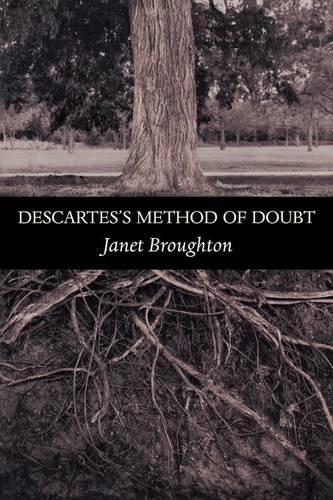
Descartes's Method of Doubt
(Paperback)
Publishing Details
Descartes's Method of Doubt
By (Author) Janet Broughton
Princeton University Press
Princeton University Press
5th January 2004
United States
Classifications
Professional and Scholarly
Non Fiction
194
Physical Properties
Paperback
240
Width 152mm, Height 235mm
340g
Description
Descartes thought that we could achieve absolute certainty by starting with radical doubt. He adopts this strategy in the "Mediations on First Philosophy", where he raises sweeping doubts with the famous dream argument and the hypothesis of an evil demon. But why did Descartes think we should take these exaggerated doubts seriously And if we do take them seriously, how did he think any of our beliefs could ever escape them Janet Broughton undertakes a close study of Descartes's first three meditations to answer these questions and to present a fresh way of understanding precisely what Descartes was up to. Broughton first contrasts Descartes's doubts with those of the ancient sceptics, arguing that Cartesian doubt has a novel structure and a distinctive relation to the commonsense outlook of everyday life. She then argues that Descartes pursues absolute certainty by uncovering the conditions that make his radical doubt possible. She gives a unified account of how Descartes uses this strategy, first to find certainty about his own existence and then to argue that God exists. Drawing on this analysis, Broughton provides a new way to understand Descartes's insistence that he hasn't argued in a circle, and she measures his ambitions against those of contemporary philosophers who use transcendental arguments in their efforts to defeat scepticism.
Reviews
"This is a brilliant book, written in a flowing and elegant prose that belies the extraordinary erudition, and philosophical rigor and subtlety which it contains."--Jorge Secada, Philosophical Quarterly "In this clearly written and engaging book, Broughton argues that the method of doubt is in fact constructive, a strategy for uncovering the first principles of philosophy by showing that the truth of certain beliefs is a condition for the method of doubt."--Deborah Boyle, Philosophy in Review "Simply put, this is a superb book. It provides a deep, learned, and philosophically engaging reading of the method of doubt as laid out in the first three meditations... Exemplary in its capacity to seamlessly combine scholarly debate, history of ideas and original philosophising in a clear and lively prose style. The book will be an essential reference in future discussions of Descartes and his method of doubt."--David Macarthur, Philosophical Books "Descartes's Method of Doubt offers a compelling new reading of what the method of doubt involves, and of the work that it does in the Meditations... Broughton's book must count as a significant contribution to Cartesian studies and early modern philosophy, and it is surely one that will be accorded close attention by scholars in the field... [I]t is clearly and elegantly written... incisive, insightful and illuminating."--Cecilia Wee, British Journal for the History of Philosophy
Author Bio
Janet Broughton is Professor of Philosophy at the University of California, Berkeley.
